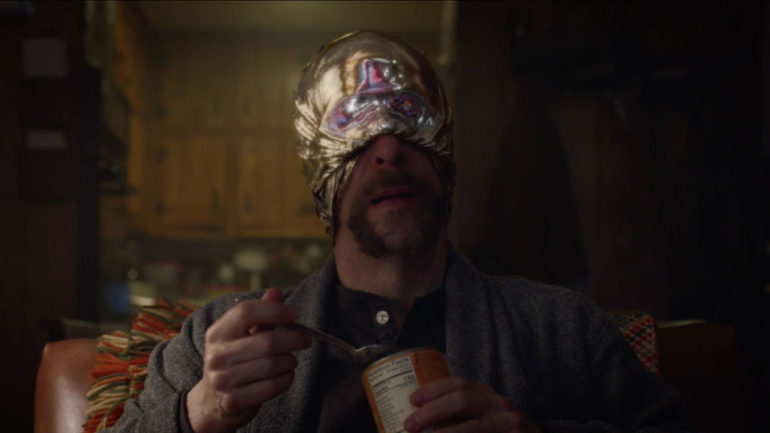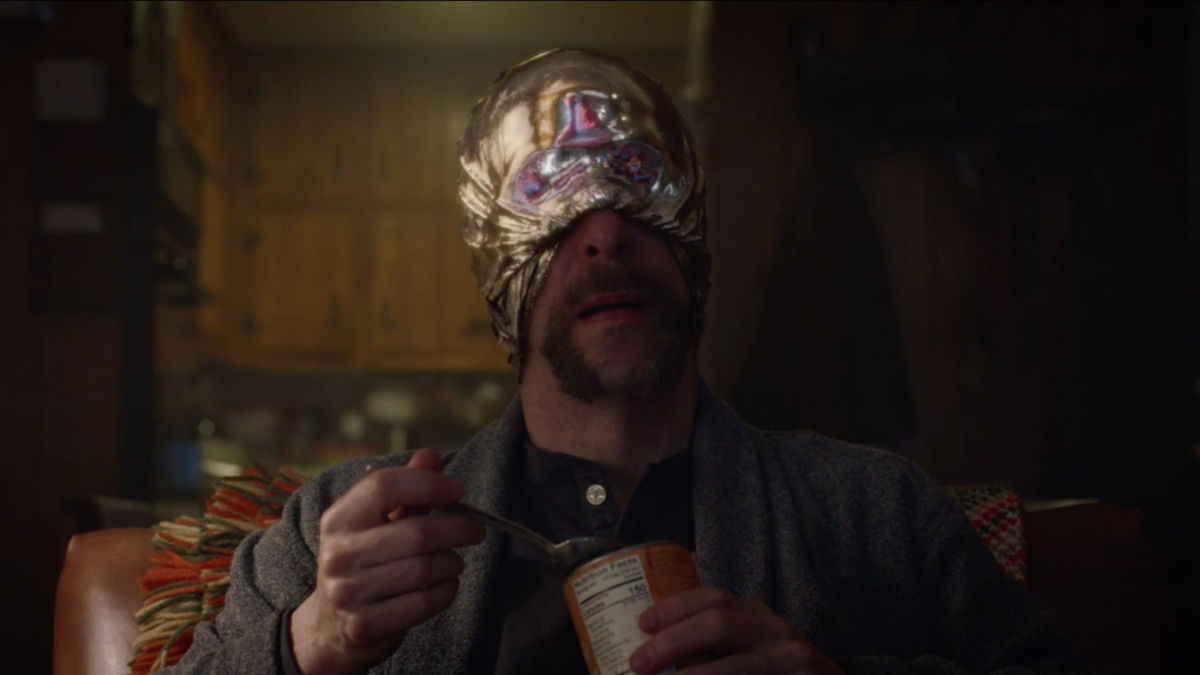As Watchmen’s been damned as ‘too political’ for the horrible crime of having a black woman as it’s main character, you might say that ‘Little Fear Of Lightning’ is being intentionally crowd-pleasing by focusing on the calmer waters of a white male character. Rorschach accidentally stumbled being into the fan favourite of the original, of course, so if Looking Glass’s whole survivalist vibe wasn’t already making you associate him with Rorschach – more so, even, than the Seventh Cavalry’s cosplaying – then this his spotlight episode, almost certainly will. It starts off with a moment of sexualised trauma, covers his fairly bleak daily life, and then proceeds to build from there.
Which is odd, since the show’s already leant on those parallels plenty. He considers his mask his face. He’s wont to roll it up, revealing only his mouth – and the revelation he was crying under it, as we had in the first episode, was of course how Rorschach’s own story came crashing to an end. And when we first had a session with him in the mirrorball – yes, he’s reflecting the screens around him, but he’s also reflecting his interviewees, the guys who model themselves on Rorschach. If anything, the show seems to be leaning on these parallels too much.
This should tell you something in an episode which is quite so full of deliberately constructed situations. First and foremost of these is obviously squid day, or 11/2 as it’s popularly known – and lending it facets of both 9/11 and the Holocaust is dancing on the edge of tastelessness even before considering it was a false flag. The only thing saving it is its presentation as completely straight-faced serious, and that’s in an episode with a few more yuks than the show’s tended toward previously.
The day of the squid, as depicted in ‘Little Fear Of Lightning’, is by a wide margin the clearest distinction so far drawn between the show’s world and ours. Everything else, including Dr. Manhattan knocking about on Mars, has been at best literally in the background. The fact that Vietnam became the 51st state, you have to work out from the clues. But our tentacled friend is front and centre.
This is partly some big, juicy worldbuilding of the kind that’s been sorely missed so far – and which this episode does a lot to make up for – but it’s also emphasising constructed situations. Because, as mentioned, squidgate isn’t the only construction in play. Going through ‘Little Fear Of Lightning’ you’ll find a few lines and plot points (not to mention choices of background music) that feel a little too on the nose, and probably end up wondering, can they be quite real? Well, ‘real’ is a hard thing to define in a work of fiction at the best of times, but there’s also the half-paradoxical fact that if something’s staged – like one wrestler belting another with a folding chair – this doesn’t mean it hasn’t happened.
And if many of the events of ‘Little Fear Of Lightning’ are being constructed for Looking Glass’s benefit – using the term loosely – then if there’s one person he’s reflecting, it’s us, the viewer. He’s not a dead-on analogy, as he’s not simply a passive observer, he’s taking part in what’s going on – but what he is, to repeat myself, is a white man, the demographic traditionally thought of as ‘normal’ (as opposed to black women, who, as we’ve seen, are considered ‘political’ – don’t ask me how that works).
There’s a great deal of scholarship that’s gone into how works of fiction are constructed for an assumed white male audience – which makes it hard to think his day job being in media analysis is accidental. And while this doesn’t necessarily disprove his claim that he can tell when people are lying, it does suggest certain blind spots – big enough, certainly, to still allow him to be taken by surprise. Crucially, often by women.
In the comics, the fact of squidghazi’s construction gave our ostensible heroes a clear choice – swallow the big lie, no matter how foul it tastes going down, or blow the whistle and risk far more people getting hurt and killed. Towards the end of ‘Little Fear Of Lightning’ Looking Glass has what seems like a cavalcade of such impossible choices thrown at him, if not of the same scale then of the same sort of labyrinthine morals. In the original setup, Rorschach is of course the one defector, the only one, in his own words, unwilling to compromise even in the face of armageddon – which is as much of a climax as squidshima itself.
‘Little Fear Of Lightning’ is, of course, the fifth episode of the show. The fifth issue of the original comic, ‘Fearful Symmetry’, ended on Rorschach being set up and arrested. Nothing of the sort happens to Looking Glass, but if – and I’m confirming nothing – this episode were to end with someone else being set up and arrested, it would likely follow that they’re the closer fit to the Rorschach mould here. No matter how different in terms of demographics they might happen to be.
If there’s one takeaway from this episode, it’s that Looking Glass is too much the innocent to be a serious Rorschach type. Or if not too much the innocent, then too much the victim. Sister Night, by contrast, has transgressed against both the law and her colleagues who keep the law, as I’ve clumsily overlooked in weeks past (the issue with writing to a deadline is that you find yourself with a lot of regrets). Which, now this is out in the open, creates the obvious parallel with the original. Alan Moore had always considered the slightly pathetic figure of Nite Owl to be the one readers would latch onto as protagonist. Instead, despite the author’s wishes, they held onto Rorschach for dear life – despite his flaws? No, probably because of them. So that’s at least one lesson learnt from the original.
Some of the coverage you find on Cultured Vultures contains affiliate links, which provide us with small commissions based on purchases made from visiting our site.


